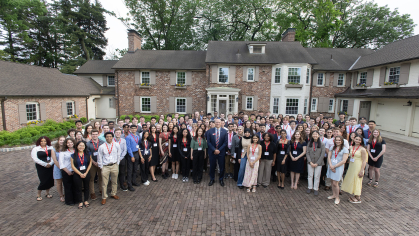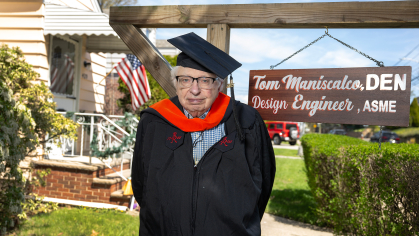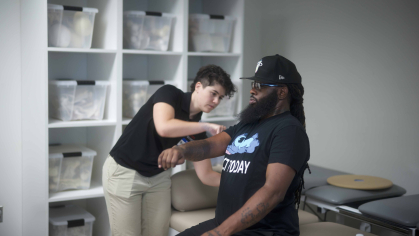The Trauma of Surviving Hurricane Katrina Inspired Award-Winning Student Filmmaker
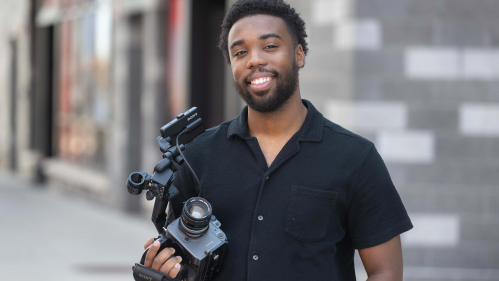
Terrance Leon George II suffered a head injury and lost his home in the devastating storm, but discovered his passion for the camera

The traumatic experience of surviving Hurricane Katrina at the age of 4 created hardship for Terrance Leon George II, but also taught him about the power of filmmaking.
George lived in Gulfport, Mississippi, with his mother and twin brother in 2005 when the deadly Category 5 hurricane devastated the Gulf Coast. George suffered a head injury in the storm when an object fell on him as Katrina ripped apart his family's house. He didn't see what was coming as it happened and, to this day, is not sure what caused the injury.
“I remember our house flooding and collapsing. My mom was a single mom, and she couldn’t pick up her last check from work before the storm, so it was a really tough time for us,” George recalls. “While we were trying to find food and other things, the film crew from Feed the Kids found us. I remember watching the guy behind the camera and just thinking, ‘that looks so cool, I wish I could do that.’”
The recovery process from the storm was a long one, with George requiring speech therapy to be able to talk again. He took the opportunity to teach his classmates at his new school in Somerset, New Jersey – where his family moved with the help of his grandfather – what he had been through. He demonstrated with blocks and water what a hurricane can be like.
“Even then, I knew that there was motion in emotion. Showing people things is always better than just telling them. This is what I came to realize was my superpower and I knew I needed to use this for good,” George states.
Twenty years later, George fulfilled his desire to tell good stories and has won several major film festivals. He was inspired to apply to the Mason Gross School of the Arts at Rutgers-New Brunswick after attending the New Lens Film Festival, an annual competition of students’ work.
“I came to the New Lens Film Festival and was so impressed with what I was seeing. I knew that I needed to be at Rutgers, and I had every intention set to win New Lens at some point; I just didn’t know it would be that following year. I came, saw and conquered in the most unique way,” George says.
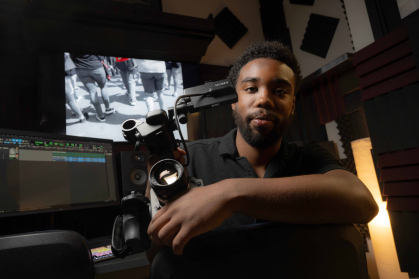
His short film, Can I Grow Old, won the faculty jury award at New Lens and also won Best New Jersey Film at the Bernardsville Film Festival, Best Short Film at HBCU Firstlook, presented by comedian Loni Love, and the Leadership Award from Raritan Valley Community College. “The film focuses on black-on-black violence but in a way that humanizes both the victim and the aggressor to show how there are so many more elements at play in this dynamic. It also serves as a reminder to our community to see each other as whole beings,” George says.
Using societal issues as a backdrop, George wants his films to inspire people to have candid conversations. He hopes to take his work to a major streaming platform after graduation to create more pieces that force people to think.
“I’m helping a friend produce a documentary about HIV and helping to destigmatize the diagnosis and helping others see these people as just as human and deserving of a full life as anyone else. She went viral after she shared her diagnosis and we both wanted to channel that power into something positive,” George says.
He traces his desire to help others to his childhood experience and the assistance his family received from his grandfather in the aftermath of Katrina. After Hurricane Sandy struck New Jersey devastating parts of the Jersey Shore in 2011, George was on the front lines, volunteering his time to those who needed it most.
“It brought me back to being in Mississippi, wandering around hoping for some sense of assistance. Even a human connection to let me know everything was going to be okay. I knew I needed to be that for someone else, so it was no question on whether I was going to help, just a matter of how,” George reflects. “Just like how my grandfather came for us, I knew I could be the beacon of hope someone needed that day.”
George’s grandfather drove from New Jersey to Mississippi to rescue his family as soon as the roads were clear. As they entered the tri-state area, George recalls his first exposure to the Rutgers R.
“As we got closer to what would be home, I kept seeing all these red Rs everywhere and I wondered what they meant. Now all these years later, I’ve been indoctrinated into the R family. Clearly it was meant to be,” George humors.
